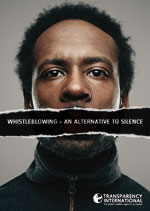The Financial Times recently reported on the travails of eight British whistleblowers who exposed wrongdoing through clandestine photocopying operations and other desperate measures.
This is a global problem.
 Whistleblowers are still seen as “snitches,” “traitors” and “informants”, particularly in former Communist countries, according to our 2009 report on whistleblowing laws in Europe.
Whistleblowers are still seen as “snitches,” “traitors” and “informants”, particularly in former Communist countries, according to our 2009 report on whistleblowing laws in Europe.
These negative attitudes are reflected in the school yard, where children often resent their peers who report misbehaviour to parents or teachers.
This is why I’ve spent time explaining the difference between reporting wrongdoing and “tattling” or “squealing” to my two young sons, Joshua and Forest. I really like it that both of my boys speak up – or even push – when they see something wrong going on.
Joshua, 12, calmly assesses problems in the lunchroom and on the football field before carefully deciding who he should tell, if anybody. His reactions are measured, with an eye on peaceful resolution by an adult. He’s respectful of everyone’s job in achieving justice. He’s so good at this that his principal has chosen him to be a “peer counsellor” to help other students work through their difficulties.
Forest, 4, is much more the judge-and-jury type. Yesterday, he was arguing with his preschool buddies about who should climb down from a wooden platform first. Instead of asking a teacher to intervene, Forest took matters into his own hands and simply shoved a kid who was trying to wedge his way to the front of the line out of the way. (In Forest’s defence, he wasn’t trying to push the boy off the platform, and luckily, his two-metre fall was broken by soft playground sand.)
What is the best way to instill a sense of justice our children? How should we train employees to respond to corruption in the workplace? In this regard, nurture can trump nature: as parents, we have a lot of influence and control over how our children handle difficult situations. The same goes for national legislation.
A recent report on corruption in Europe warned that only 19 out of 25 countries have adequate laws to protect whistleblowers. The situation is little better in Latin America, especially those countries struggling with organised crime.
In the United States, by contrast, whistleblowers now receive a financial reward.
When he’s out in the work world, which will only be a few years from now, I would be proud of Joshua if he has the courage to report corruption to the proper authorities – just the way he handles things now. His company is bribing a foreign government to win a construction contract. What would Joshua do? Calmly bring it up to his boss, I’d hope, and if that doesn’t work, take his evidence and his story to government officials.
Forest has a few more years to go, but having talked to hundreds of whistleblowers I can already imagine the scenario. The director of the federal ministry where he works is conspiring with influential members of Parliament to steer government contracts to his family’s company. Indignant, Forest gets right into the director’s face and says that he has the New York Times on speed-dial, and he’d better think of something quick to fix the situation – or else.
Although many whistleblowers pay too high a price, it is important to remember that every day, people working in companies and in government agencies step up to report wrongdoing. Their concerns are heard and considered. They keep their jobs. They go on with their lives as normal.
But as tough and fair as my kids are, even they will need the benefit of strong whistleblower laws to protect them from retaliation, and to provide a way for them to report corruption to people who could put a stop to it. Without these laws, the toughest and fairest among us can be powerless to stop crimes and wrongdoing.
Whether you have a Joshua or a Forest, teach them well in the art of corruption fighting. They are the whistleblowers of the future.















 Connect with us on Facebook
Connect with us on Facebook Follow us on Twitter
Follow us on Twitter